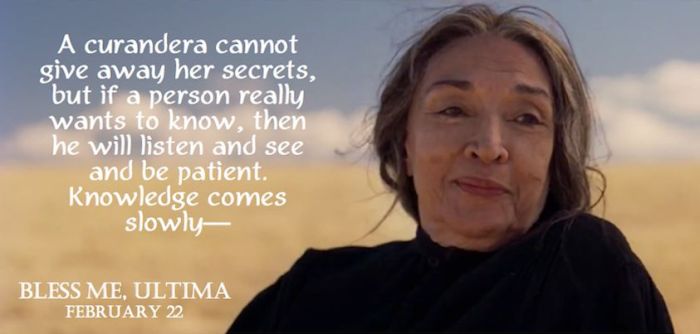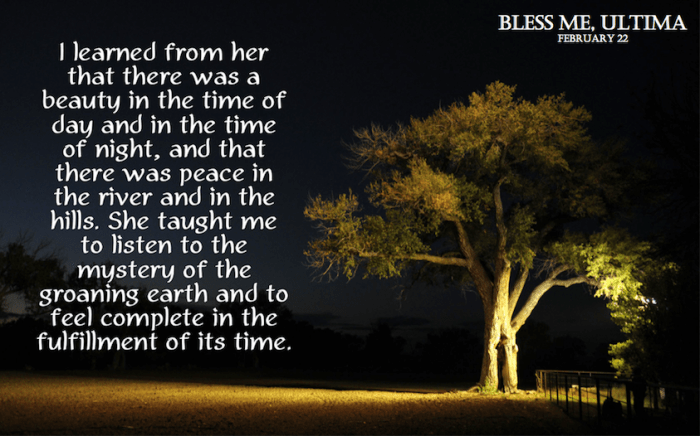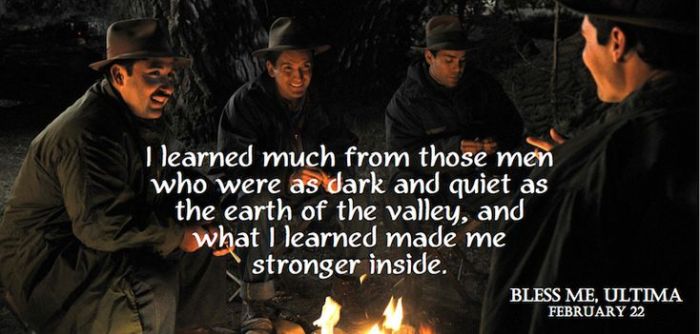Bless me ultima quotes and page numbers – Bless Me, Ultima quotes and page numbers provide a roadmap to the novel’s most profound and memorable moments. Through these carefully chosen words, author Rudolfo Anaya illuminates the novel’s central themes and characters, inviting readers to engage with the complexities of cultural identity, spirituality, and the human experience.
Throughout the novel, Ultima, the enigmatic curandera, emerges as a guiding light, imparting wisdom and offering solace to the young protagonist, Antonio. Her words, often steeped in ancient traditions and folklore, resonate with a timeless quality, transcending the boundaries of time and space.
Identify Key Themes

Bless Me, Ultima explores several key themes, including:
- The power of faith and spirituality:The novel follows the spiritual journey of Antonio, a young boy growing up in the American Southwest. Antonio’s relationship with Ultima, a curandera, and his experiences with both Catholicism and indigenous traditions shape his understanding of the world.
- The importance of community and family:The novel depicts the close-knit Mexican American community in which Antonio lives. The bonds between family and friends play a crucial role in shaping his identity and providing him with support.
- The struggle for identity:Antonio grapples with his identity as a Mexican American in a predominantly Anglo society. The novel explores the challenges and complexities of assimilation and cultural preservation.
- The role of women:Bless Me, Ultima features strong and influential female characters, including Ultima, Maria, and Tenorio’s mother. The novel explores the roles and experiences of women in the Mexican American community.
- The conflict between good and evil:The novel presents a struggle between the forces of good and evil, as represented by Ultima and Tenorio. This conflict reflects the broader themes of faith, spirituality, and the human condition.
Character Analysis

| Name | Relationship | Description |
|---|---|---|
| Antonio Marez | Protagonist | A young Mexican American boy who is searching for his identity and place in the world. |
| Ultima | Mentor | A curandera who becomes Antonio’s spiritual guide and protector. |
| Maria Marez | Mother | Antonio’s loving and supportive mother. |
| Gabriel Marez | Father | Antonio’s stern and hardworking father. |
| Tenorio Trementina | Antagonist | A brujo who represents the forces of evil and chaos. |
| Florence | Friend | Antonio’s best friend, who is also struggling with issues of identity and belonging. |
Symbolism and Imagery
Bless Me, Ultima employs rich symbolism and imagery to convey its themes and ideas:
- The golden carp:The golden carp represents Antonio’s spiritual journey and his connection to the natural world.
- The owl:The owl is a symbol of wisdom and guidance, and it often appears in Antonio’s dreams and visions.
- The river:The river symbolizes the flow of life and the passage of time.
- The moon:The moon represents the cycles of life and death, as well as the power of the feminine.
- The desert:The desert represents the harsh realities of life and the challenges that Antonio must face.
Cultural and Historical Context: Bless Me Ultima Quotes And Page Numbers
Bless Me, Ultima is set in the American Southwest during the mid-20th century. The novel reflects the experiences and perspectives of Mexican Americans during this period, including their struggles with discrimination, poverty, and cultural assimilation:
- The zoot suit riots:The novel references the zoot suit riots, which took place in Los Angeles in 1943. These riots targeted Mexican American youth and highlighted the tensions between the Mexican American community and the Anglo majority.
- The Bracero Program:The novel also mentions the Bracero Program, which brought Mexican workers to the United States to work in agriculture. This program contributed to the Mexican American population in the Southwest.
- The Catholic Church:The Catholic Church played a significant role in the lives of Mexican Americans during this period. The novel explores the complex relationship between the Mexican American community and the Church.
Literary Devices

Bless Me, Ultima employs various literary devices to enhance its storytelling and convey its themes:
- Foreshadowing:The novel uses foreshadowing to hint at future events, such as the death of Ultima.
- Symbolism:As discussed earlier, the novel uses symbolism extensively to convey its themes and ideas.
- Character development:The novel traces the growth and development of its characters, particularly Antonio.
- Imagery:The novel employs vivid and evocative imagery to create a sense of place and atmosphere.
Critical Reception
Bless Me, Ultima has received critical acclaim for its lyrical prose, rich symbolism, and exploration of cultural identity. The novel has been praised for its authenticity and its ability to capture the experiences of Mexican Americans in the American Southwest:
- National Book Award:Bless Me, Ultima won the National Book Award for Fiction in 1973.
- American Library Association Notable Book:The novel was named an American Library Association Notable Book in 1973.
- New York Times Bestseller:Bless Me, Ultima was a New York Times bestseller for over a year.
Question & Answer Hub
What is the significance of the page numbers in Bless Me, Ultima quotes?
The page numbers provide context for the quotes, allowing readers to understand the specific moments and circumstances in which they were uttered.
How can Bless Me, Ultima quotes be used in literary analysis?
Quotes from Bless Me, Ultima can serve as evidence to support interpretations of the novel’s themes, characters, and symbolism.